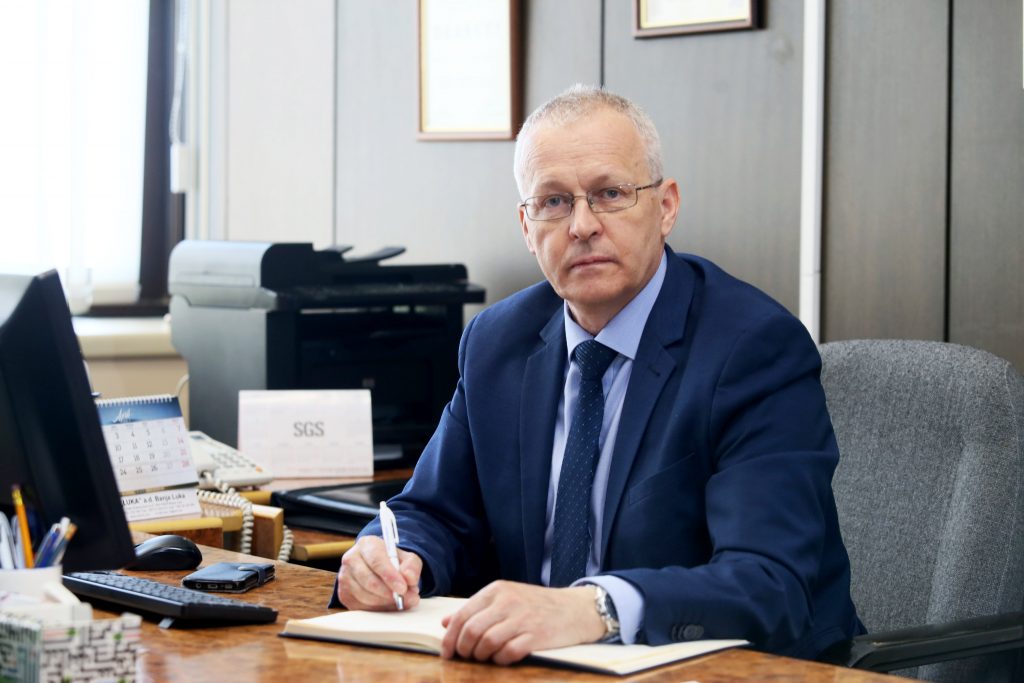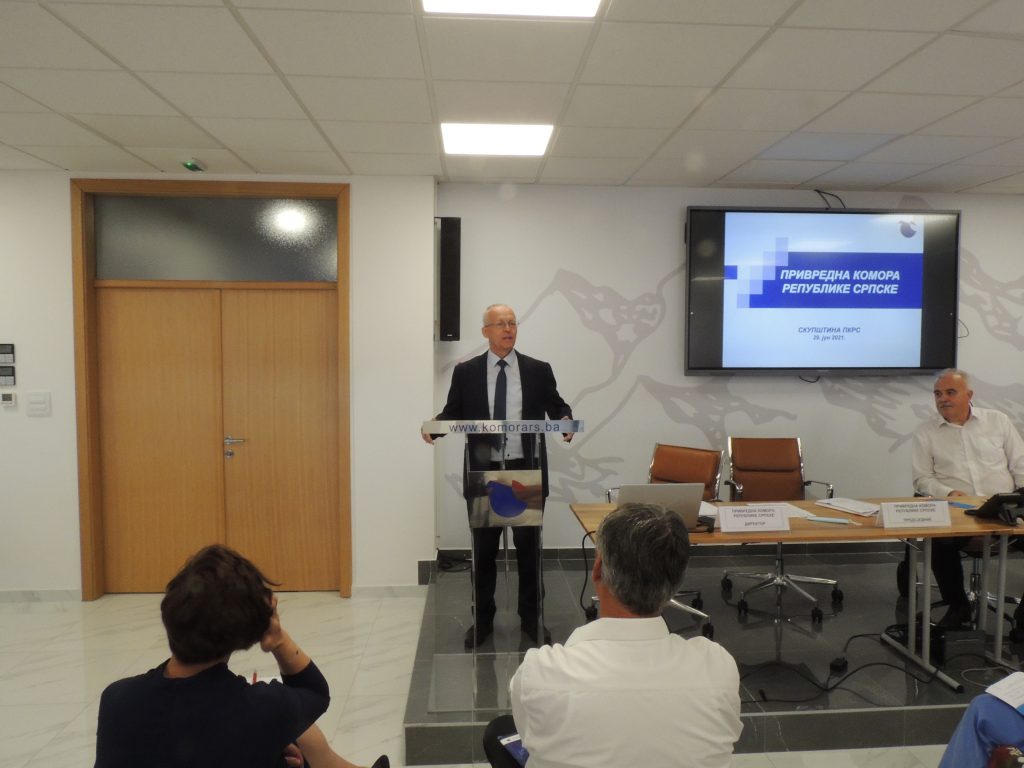Taking part in creating the most important strategic and programming documents of the Republic of Srpska will continue to be among one of the Chamber’s top priorities.
The Chamber of Commerce of the Republic of Srpska (CCRS) is a leading institution that represents the interests of the country’s economy, establishes and improves business relations with foreign countries and is always there to support its members. Given that the COVID-19 pandemic has had a strong negative impact on the economy, especially on the countries that are not so wealthy, we spoke with the CCRS President, Pero Ćorić, about how the Republic of Srpska’s economy is recovering and the Chamber’s contribution to that.

You were recently elected the Chamber’s President with your previous position being the Chamber’s director. What will be the priorities on your agenda at the beginning of your term?
The Chamber of Commerce has always been a true home to our business community and its voice, as well as the creator of solutions based on the business community’s requests, initiatives and proposals.
In this regard, one of the Chamber’s priorities will be to continue taking part in creating the most important strategic and programming documents of the Republic of Srpska. One of those documents is certainly the Economic Reforms Programme, which the National Assembly of the Republic of Srpska adopts every year following the government’s proposal. The Chamber actively participates in the drafting of this document. In order for the adopted documents to have a full effect, the Chamber will continue to advocate for the implementation of defined measures, to improve business conditions, help the economy and ensure its development.
“In cooperation with various donors, the Republic of Srpska’s Chamber of Commerce has so far implemented over 50 projects to support the economy”
Considering that Bosnia and Herzegovina’s institutions are in charge of drafting and implementing a significant number of regulations that are important for the economy, by operating within the Bosnia and Herzegovina’s chamber system, our chamber will especially focus on resolving issues such as customs policy, indirect taxes, external trade conditions, etc.
In cooperation with various donors, the Republic of Srpska’s Chamber of Commerce has so far implemented over 50 projects to support the economy. It is currently implementing 12 projects, which validates the fact that the Chamber of Commerce has enough adequate staff to meet the strict requirements of international donors. This is also a guarantee that we will successfully apply for participation in other projects in the next period, all to provide concrete support to companies in the Republic of Srpska.
Furthermore, we will continue to promote the economy of the Republic of Srpska in foreign markets, connecting our business people with foreign partners, providing training and carrying out a number of other activities.

How would you rate the Republic of Srpska’s economy? What is it that sets it apart from other economies and which sectors would you like to single out?
The Republic of Srpska’s economy is predominantly made up of micro, small and medium-sized enterprises, which need dynamic development based on the implementation of new technologies, know-how and innovations, to boost their competitiveness and bridge the gap between them and the more developed European economies. On the other hand, the electricity sector, metal-processing industry, agriculture, food industry, forestry and wood processing have the greatest investment potential in the Republic.
“In every sense, including the economic one, Serbia is the most important partner of the Republic of Srpska”
The wood-processing industry and spa tourism based on thermo-mineral waters with fantastic medicinal properties are particularly important resources. Also, we have the potential to form bauxite and alumina complexes, the construction of energy facilities, infrastructure, etc.
How can the Republic of Srpska boost its economy and economic cooperation with Serbia?
In every sense, including the economic one, Serbia is the most important partner of the Republic of Srpska. If we look at the data on the external trade between the two countries during the first six months of 2021, Serbia occupies the first place. The total value of this trade was KM 752.4 million, of which the Republic of Srpska exported KM 284.5 million worth of goods, and imported KM 467.9 million. These indicators also show that there is a lot of room for exporting more of our products to Serbia. Various researches have shown that a large number of our consumers consider products from Serbia as domestic, and we want people in Serbia to feel the same about the products from the Republic of Srpska. We cannot achieve this overnight. It is a process during which the Chamber of Commerce of the Republic of Srpska wants to cooperate with the Chamber of Commerce and Industry of Serbia, but also with all other institutions interested in increasing the presence of our products on the Serbian market. Several initiatives have already been launched and a number of events have been organized to present Srpska’s offer in Serbia. We have to work hard on this to achieve our goal.
How did the COVID-19-induced crisis affect the business conditions and what consequences do you expect to see this year?
We have been through an extremely difficult, challenging and unpredictable period, which has negatively impacted almost all companies in the Republic of Srpska. The tourism and transport sectors have suffered the most. However, one thing is for sure, as the epidemiological situation becomes better, that does not automatically mean the end of all the problems that the pandemic caused to our economy, and we will, unfortunately, feel the consequences in the coming period too.
“Last year, the Chamber of Commerce of the Republic of Srpska opened two centres – the Centre for Digital Transformation of Economy and the Centre for Dual Education and Education Policy”
On the other hand, we are encouraged by the data which show that the positive results that our economy recorded late last year continued into the first half of this year. I must especially underline the recovery of our processing industry, which is mostly export-oriented. This recovery comes as a result of the economic recovery of the EU countries since they are the biggest export market for the Republic of Srpska. It is also crucial that our companies are strongly committed to investing in new technologies, new equipment, digitalization and, human resources development, including their participation in improving students’ work practice held under the auspices of the dual education system, which will certainly increase productivity and thus the competitiveness of our economy.

How can towns in the Republic of Serbia improve their environment for doing business?
Every local community should aspire to create more favourable and predictable business conditions. It is for this reason that the Chamber has been actively involved in eliminating numerous barriers that cause problems for domestic companies at the local level. Also, the Chamber of Commerce is the technical secretariat for the implementation of the regional BFC SEE programme for certification of cities and municipalities with a favourable business environment, launched by the NALED. Experience so far shows that local communities that have met the conditions for obtaining this certificate have achieved more dynamic economic development and attracted a larger number of new investors. I am pleased to say that the importance of this standard is recognized in other local communities and that today we have five more municipalities that have expressed interest in getting involved in this process. Bearing in mind that local communities are important for creating business conditions and prerequisites for new investments, we will especially focus on the additional promotion of this certification programme, so that as many towns and municipalities as possible meet the requirements and receive the certificate for having a favourable business environment.
Which projects will the Chamber focus on in the coming period?
In response to the most important needs of the economy – digitalization and quality education in accordance with the needs of our companies – the Chamber of Commerce of the Republic of Srpska opened two centres – the Centre for Digital Transformation of Economy and the Centre for Dual Education and Education Policy – last year. Our focus will be in this direction, but we must not forget other projects either. We will continue to concentrate on companies (in terms of conquering new markets), and adopting new knowledge and skills, in which the Chamber of Commerce will be their true partner.
Which direction will the Republic of Srpska’s development take in terms of both the region and the European Union?
The growth of export, which has been recording record-breaking values since the establishment of the Republic of Srpska, shows that we have the potential and opportunity to position ourselves even better in the regional market, especially in the European Union, which is, as I said, our largest export market. It is encouraging to see that, despite the numerous challenges our companies have been facing in the past year and longer, they did not lose any of their main business partners abroad. We have also noticed a significant increase in exports compared to last year to countries such as Poland, France and Romania. We are especially pleased that our processing sector has been accomplishing better results and meets the extremely demanding European market, in terms of quantity, delivery times and quality of products. Furthermore, by investing in new equipment and raising the technical and technological level of businesses in the Republic of Srpska, for which we need additional government assistance, we will boost our competitiveness and improve our position in both the regional and European markets.